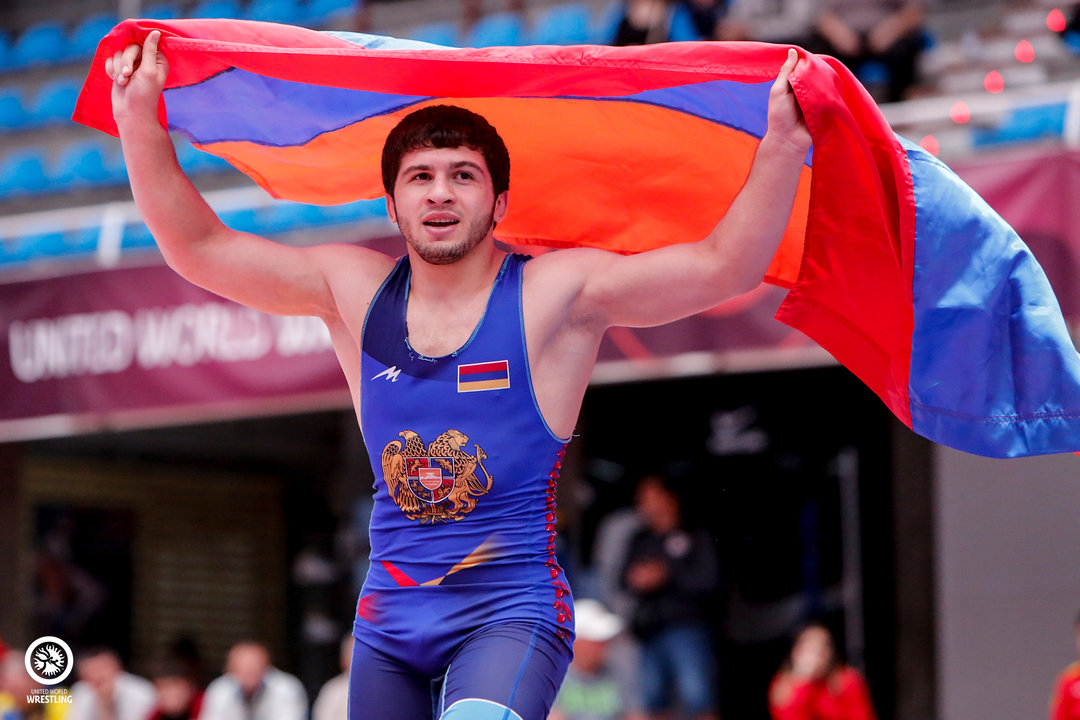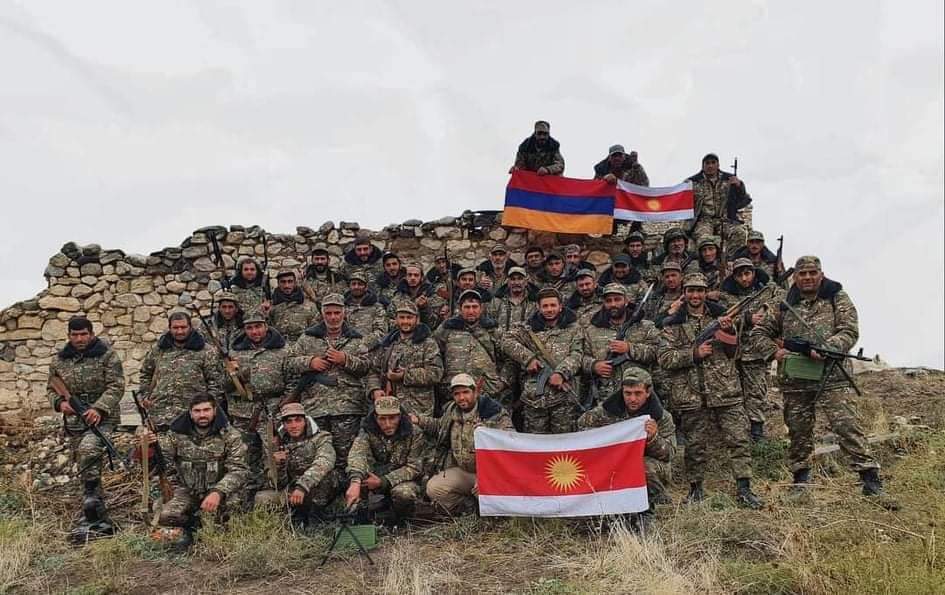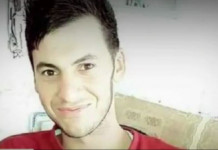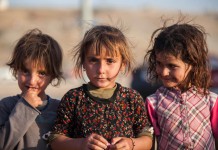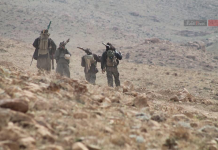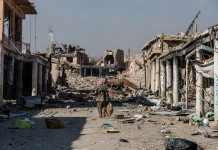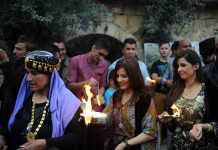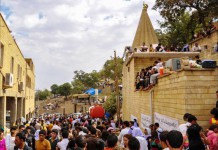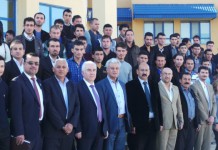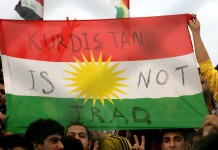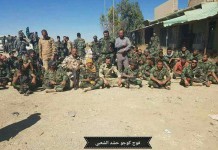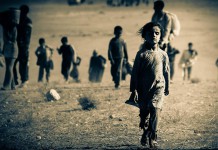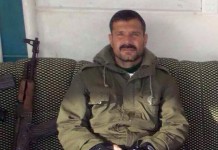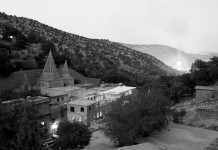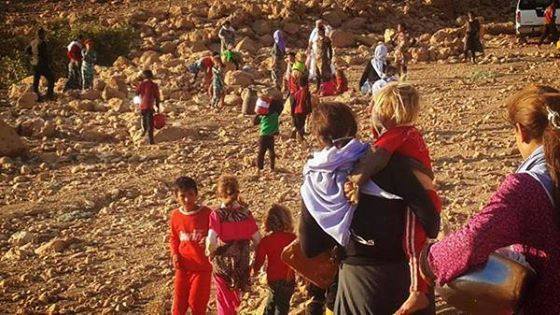
by Dr. Amy L. Beam
Over 20,000 Yezidis from Shingal, Iraq, have been living in refugee camps in southeast Turkey since September, 2014. They do not want to face a second winter stuck in tents or over-crowed rooms in Turkey. They are faced with choosing between three deeply problematic options:
• remain living in refugee camps with increasing food insecurity and fear of being sent back
• risk crossing a border into Europe and being beaten back as happened December 21, 2014, or
• return to demolished Shingal, the site of the genocide against them.
They have organized international and camp committees to lobby governments for entry into Europe. So far, European consulates in Ankara have asked them to be patient. But their patience is running out, and they are psychologically sick with fear and frustration.
The Islamic State Attack
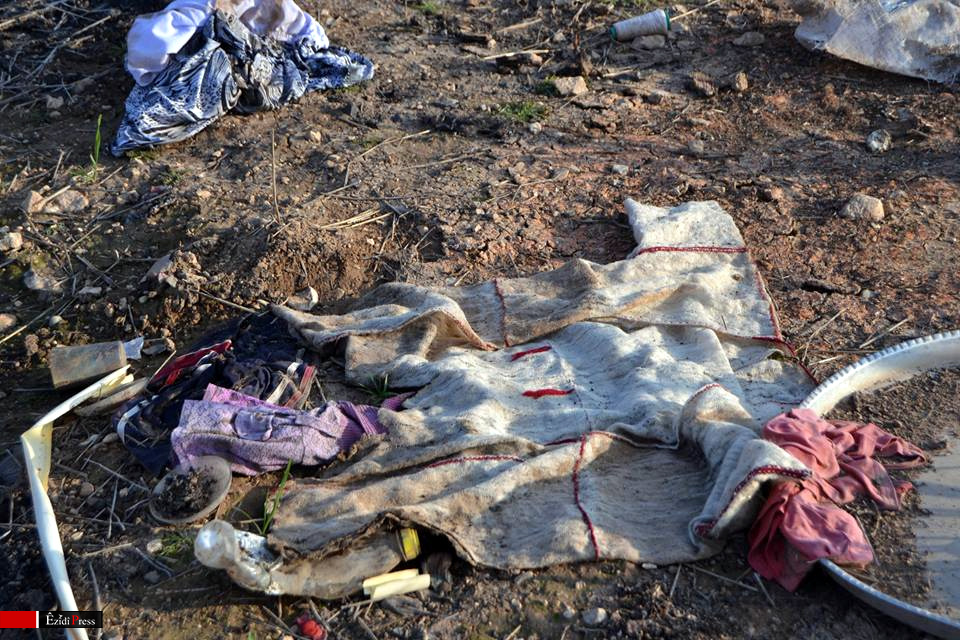
On August 3, 2014, Islamic State (ISIS) terrorists, referred to as Daash in Iraq, attacked the towns and cities of Shingal, Iraq. According to statistics collected by Yezidi Judge Qasim Osman Rafu in Sulaimani, Kurdistan, over 9,000 Yezidis were killed or kidnapped. Thousands of women and girls were raped and sold into sexual captivity. At least 8,000 Yezidis are still missing.
Judge Qasim has created a database with over 4,000 names of martyred, missing, and murdered Yezidis.
The attack sent the entire Yezidi population of 450,000 people fleeing. The world watched mesmerized as an estimated 100,000 Yezidis were stranded on Shingal Mountain without enough food or water for eight days.
The YPG Kurdish guerilla fighters opened a corridor for the stranded Yezidis to escape the mountain and walk to the border of Syria. From Syria they were transported to Duhok then Zakho in Kurdistan (autonomous Kurdish region in northern Iraq).
There are an estimated 420,000 internally displaced Yezidis in Kurdistan and another 25,000, who were guided over the mountain into Turkey by the PKK. The mountain village of Roboski, Turkey, with a population of 1200 Kurds, saved 20,000 Yezidis who came on foot and were then dispersed to Kurdish camps in the southeast. The leader of this rescue effort was Ferhat Encu who was elected to Turkey’s Parliament on the HDP ticket on June 7, 2015.
Yezidis Want Asylum in Europe
I visited my first Yezidi refugee camps in Roboski School and Hilal School last September, then proceeded to visit all of the Kurdish-run refugee camps in Turkey. In every camp, the same question was posed to me: “When is someone going to tell us where we are going?”
I told everyone, “The answer is never. No one is ever going to come and tell you where you are going. You won’t go anywhere until the Yezidis organize and raise their voice as one powerful voice to be heard internationally. No one will do it for you.”
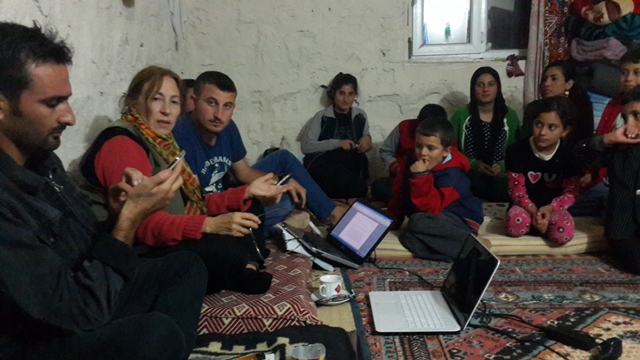
Ten months after the initial trauma, Yezidis have organized committees within every camp as well as an international commission. Commission representatives have met repeatedly with the United Nations High Commission on Refugees (UNHCR), Turkish government officials, and various European consulates in Ankara to plead the Yezidi case for asylum. So far, they have met with polite receptions, but no promises.
Yezidis continue to insist that they want to go to Europe and refuse to return to Iraq. (See “Genocide: 10 Reasons Why Ezidis Refuse To Return To Shingal.“) They express gratitude to the PKK forces, but the Yezidis do not want to be used as pawns to regain the territory of Shingal. They have begun to see the Kurds as their jailers rather than their saviors.
It is not that Yezidis don’t love their homeland. When they see videos and photos of when they led a normal life filled with picnics on Mount Shingal, high school graduations, and friends, they break down in tears. They long to return to their beloved Shingal. They miss their lives, but there is nothing now for them to return to.
Their houses have been destroyed along with the infrastructure. Their possessions, gold, cars, businesses, and sheep were stolen.
If they return to Shingal, they will not even have tents to sleep in. They have received no guarantees of protection or financial aid to reconstruct their communities.
Those who escaped ISIS vow that they can never go back to the scene of the massacre and live surrounded by Arabs. It does not matter if it ever becomes “safe.” They are finished with the Middle East.
Kurdish Party Wants Yezidis to Return to Shingal
The Peshmerga forces of Kurdistan Regional Government (KRG), the Kurdish Workers’ Party (PKK) from Turkey, and the YPG/YPJ affiliated forces from Syria are fighting ISIS and hope to soon have Shingal region cleared of them.
Without exception, the Kurdish camp managers and party leaders say the Yezidis should stay in Turkey until Shingal is cleansed of ISIS gangs, then the Yezidis should return to Shingal when it is safe. There are different Kurdish political parties in Kurdistan, Rojava (Syria), and Turkey which support different policies, but the undisputed policy of all Kurdish parties is that Yezidis should not go to Europe.

Dr. Amy Beam met with Gharib Hassou, Rojava’s PYD party representative in Kurdistan, to convey the Yezidi sentiments and discuss options for Yezidis. The YPG and YPJ militias are the fighting forces of the PYD political party in Rojava. They are leading the fight against ISIS.
There is a government office in Duhok, Kurdistan, for Yezidis to apply for replacement ID cards. They need their ID cards and citizenship documents to apply for Iraqi passports. They are being turned away and told to travel to Baghdad, which is unsafe for them, to apply for replacement identity documents. Most of the 420,000 Yezidi IDPs in Kurdistan do not have passports to leave Iraq.
Immigration Will Be a Second Genocide
Mr. Hassou explained, “If Yezidis go to Europe, it will be a second genocide against them. They will lose their land, their culture, their music, their friends, their religion, and their community. The Yezidi culture will cease to exist. We are fighting for their land and for their future existence as a people. What are we sacrificing our lives for if they all want to go to Europe? We want them to return and be part of Kurdistan.”
I posed a second argument to PYD representative, Mr. Hassou, “They can’t go back and live where their family members were murdered in front of their eyes.”
Hassou patiently explained an irrefutable fact, “Kurds have been being killed in Iraq for the last 90 years. We’ve had one genocide after another, but we always return to our land. Saddam Hussein destroyed 5,000 villages and killed 182,000 Kurds during the Anfal campaign in 1988. He killed 5,000 Kurds in one day in the Halabja chemical gas attack March 16, 1988. The genocide against the Yezidis is no different. The Yezidis must return to their land and save their culture.”
“The world will not resettle 400,000 people.”
What argument is available to reply to the logic of Mr. Hassou’s argument? If the Yezidis permanently abandon Shingal, it will have the same effect as a second genocide. They will disappear as a people. In plain parlance, regarding leaving Shingal for good, they are damned if they do, and damned if they don’t.
Unlike the history of the Palestinians, the Kurds want the Yezidis to return and reclaim their homeland.
Shingal: A Disputed Territory
Prior to the attack on Shingal by ISIS, Shingal was one of the “disputed territories” between Iraq’s central government in Baghdad and the autonomous region of Kurdistan with its capital in Erbil. Shingal was attached to Mosul which is now under ISIS control.
The Kurds want Shingal to become part of Kurdistan.
Prior to the ISIS attack, Kurdistan had already replaced the Iraqi Army with the Kurdistan Peshmerga forces to defend Shingal. However, the Peshmerga forces are divided into militias along political party lines. The Yezidis’ trust was broken when 10,000 PDK (KDP in English) Peshmerga retreated last August without defending Shingal. The PUK Peshmerga are trying to rebuild relations with the Yezidis.
The German-Yezidi leader, Commander Haydar Shesho, formed a fighting force of 1500 Yezidis known as the HPS to fight ISIS alongside the PKK, YPG, and YPJ forces. Shesho was arrested on April 4, 2015, by order of the Kurdistan Regional Government (KRG) which is controlled by the majority PDK political party. He was accused of “creating an illegitimate militia” even though he had received financing from Baghdad central government. After demonstrations by Yezidis, Shesho was released.
It is unclear how Shingal will be governed after ISIS is defeated. On June 11, 2015, the European Parliament held a conference to discuss the transitional autonomous governance of Shingal.
Yezidis demand their own defense forces as a separate unit within the Peshmerga. The Kurdistan government opposes this.
Why Yezidis Want To Leave Turkey
 Turkey has now become the biggest refugee-hosting country in the world with more than 2 million refugees, mostly from Syria including the Kurds. In March, the World Food Program announced a cut-back in food aid to Turkey due to a shortage of funds. Since 2011 the WFP has injected $700 million into the Turkish economy. As reported in March, Turkey has already spent $4.5 billion on refugees since the beginning of the Syrian crisis.
Turkey has now become the biggest refugee-hosting country in the world with more than 2 million refugees, mostly from Syria including the Kurds. In March, the World Food Program announced a cut-back in food aid to Turkey due to a shortage of funds. Since 2011 the WFP has injected $700 million into the Turkish economy. As reported in March, Turkey has already spent $4.5 billion on refugees since the beginning of the Syrian crisis.
Very little of this aid has gone to Yezidis. Threat of food insecurity and actual starvation looms large in Yezidis’ minds. Each day they remain, their psychological distress grows deeper.
Under Turkey’s 2013 Law on Foreigners and International Protection, temporarily protected refugees must be returned to Iraq or Syria after the war ends, while the individually protected refugees must be resettled by the UNHCR.
On June 20, 2015, President Erdoğan visited the Medyat UNHCR refugee camp and promised Yezidis that they have all the same rights as Turkish citizens.
Turkish camp managers of Nusaybin camp, the other UNHCR camp, are requiring that any Yezidi who signs out and leaves with his or her ID must sign a statement acknowledging that they will not be permitted to return (even if turned back at the Bulgarian border).
Camp managers are now refusing the normal ten-day per month vacation leave time. This effectively turns Nusaybin and Medyat UNHCR camps into prisons for the Yezidis. Some Yezidis have already signed out to join others who are planning a mass exodus to leave Turkey.
Contrary to Erdoğan’s proclamation, permanent residency and Turkish citizenship are legally denied to refugees. The waiting period for an interview in Turkey with the UNHCR is 2 or 3 years for regular refugees, but for the Yezidis is now over 5 to 7 years. This is a double-standard policy against Yezidis from the UNHCR.
As ISIS is slowly pushed back in Syria and Iraq, Yezidis are afraid of being forced back to Iraq. They feel trapped in Turkey and want to escape.
They cannot continue their education in Turkish schools. Although Turkey’s law requires free education to refugees, Yezidis are not receiving this. Yezidis speak Arabic and Kurdish. In order to attend Turkish school, they would have to learn Turkish.
The Brutal Reality of Statistics
 According to the UNHCR, there are 56 million internally displaced persons (IDPs) and refugees in the world. Of these, 38 million are displaced in their own countries. It is impossible for this many people to be resettled in different countries.
According to the UNHCR, there are 56 million internally displaced persons (IDPs) and refugees in the world. Of these, 38 million are displaced in their own countries. It is impossible for this many people to be resettled in different countries.
In Rwanda, in just 100 days in 1994, 800,000 Tutsis were slaughtered by ethnic Hutu extremists.
After the genocide, ethnic identity was removed from ID cards. It is now illegal to talk about ethnicity in Rwanda. Tutsis and Hutus had to learn to live together. Almost two million people were tried in local courts for their role in the genocide and the ring-leaders were tried at a UN tribunal in neighboring Tanzania.
Unlike Tutsis, however, Yezidis insist they can never again live with their Arab neighbors. In order for a Shingal region to be re-established, the Arabs will have to move out. The divisiveness of ethnic identity and loyalty is nowhere near being eradicated. The Yezidis insist they will have to have their own political party and Yezidi defense force within Peshmerga. The Kurdistan Regional Government opposes these Yezidi demands.
A Viable Solution for Shingal Requires International Aid
Judge Qasim Osman says, “The UN Security Council must order investigation into the Shingal attack and declare it a genocide. Then the UN must meet its responsibility to allocate funds and rebuild Shingal for Yezidis to return.”
Germany is the main European country that has accepted Yezidi refugees. It is exhausting its financial and human resources while other European countries watch without significant offers to take the Yezidis. Turkey has shouldered an unfair burden for accepting refugees while Europe and the world closes its doors to them.
Non-governmental activist groups have invited Yezidis to resettle in countries as far away as Bolivia and India, but they lack funds for transportation or resettlement costs.
There are 31 countries where Iraqi citizens may enter without visas. They are mostly the countries from which persons are fleeing war and starvation like Haiti and Yemen, or they are tiny island countries like the Seychelles and Dominica, trying to boost tourism. Admirably, the list includes Ecuador which is providing asylum to Julian Assange, Wikileaks editor, where he has been trapped in the Ecuador Embassy in London.
The U.S. program to grant visas to former Iraq interpreters who worked for the U.S. Army is limited to 50 people per year.
A government program headed by Dr. Michael Blume in Baden-Wurttemberg, Germany, is offering social, medical, and psychological counseling services to women who were traumatized by their ISIS captivity. This program is limited to 1000 persons.
The rebuilding of Shingal may take 10 to 20 years. Until then, Yezidis are determined to go to Europe and beyond, with or without permission. Some will surely make it, most will not.
 Dr. Amy L. Beam promotes tourism in eastern Turkey at Mount Ararat Trek and writes political and historical commentary on Kurds and Yezidis in Turkey and Kurdistan at Kurdistan Tribune. She has been reporting on the Yezidis since September 2014. Twitter @amybeam; amybeam@yahoo.com.
Dr. Amy L. Beam promotes tourism in eastern Turkey at Mount Ararat Trek and writes political and historical commentary on Kurds and Yezidis in Turkey and Kurdistan at Kurdistan Tribune. She has been reporting on the Yezidis since September 2014. Twitter @amybeam; amybeam@yahoo.com.

